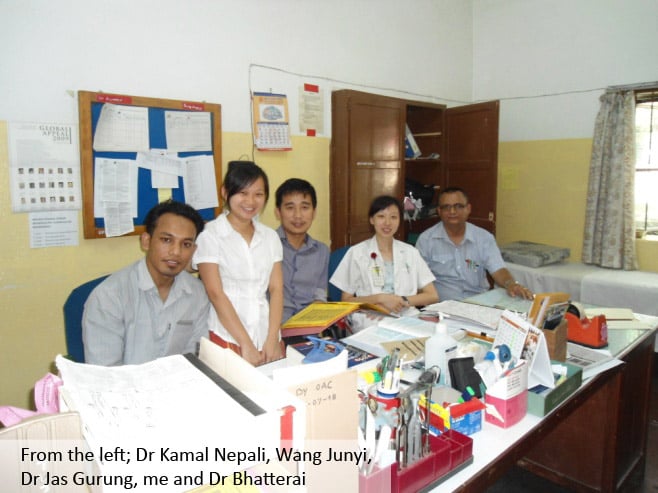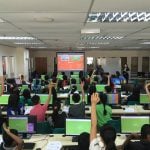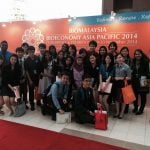The streets in Kathmandu were quieter than usual, without the daily hustle bustle of traffic. It almost seemed peaceful really until we see military and police men all about the streets carrying guns, wearing bullet proof vests, shields, batons; while they watched the people carefully. It almost felt like we were in a war zone, just one without the fear of an impending war or war. The streets were crowded with people in areas where the protest was going on, but most streets just had people walking about to wherever they planned to go-one is still expected to go to work during bandhas. I saw different things, a boy carrying a puppy onto a wagon, children playing football in streets, people setting a motorcycle on fire, people sitting on the streets, a mother putting a flower in her daughter’s hair. Life still goes on despite the nation’s economic standstill. It was a tiring walk, 2 km with at least 20 kilograms of luggage; we were exhausted by the time we arrived. We got on the bus, half dragged our luggage up and realised that the bus was full so we had to stand- but two people stood up for us to sit-two gentleman. I was so touched because sometimes this world seems so hopeless with so many horrible turn of events happening and yet in all this there is goodness still. We had it planned, we even had bus tickets. Our goal for the day was to get to Pokhara from Kathmandu. The itinerary was to wait for Roshan (who would take us to the bus station) at 6am from Bethani Guest House and the bus to Pokhara would depart at 7am. However, today there was a total ‘bandha’ (or travel strike) which included travel buses. So we had to take plan B which was to take a domestic flight to Pokhara. Great plan, difficult execution. With the ‘bandhas’ meant that we had to travel by foot to whichever destination we had to go to-in this case the airport which is a 2-3 hour walk from where we stayed; add that distance with luggage weight. Fortunately, a tourist bus from a large hotel in Kathmandu (Himalayan Hotel) had permission to travel to and fro the airport; but we still had to get to the bus at the hotel which is a 2-3 km walk. We arrived in a time when Nepal was going through a constitution change, when people were unhappy with the governments and protested to show their dissatisfaction. A ‘bandha’ is a travel strike, a form of protest that prohibits all motor-powered vehicles to travel, called by the different political parties. Fortunately, it only lasted one week and a half during our time there. Things got a lot better once when we arrived in Pokhara, and it did not really affect us much after since we walked to the hospital every day. All in all, it has been a very rich experience for me, an eye-opener and an adventure. I learnt so many things about myself, about others and about Nepal. About myself, I learnt that good intent is not good enough, that good intent is not conveyed through mere desire but instead through works and action. I show someone I care for them when it is something tangible, by sacrificing my time and being physically present, showing concern by doing. I mean well but often the intent does not come true enough because I only want to care at my convenience and that is a selfish kind of caring. I also learnt that I need to keep calm in an unknown situation (including medically-based situations), because being otherwise does not allow me to perform optimally and it is possible, just a matter of training the mind. 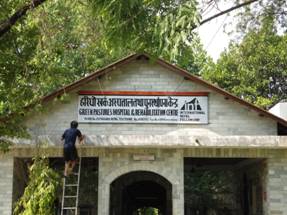
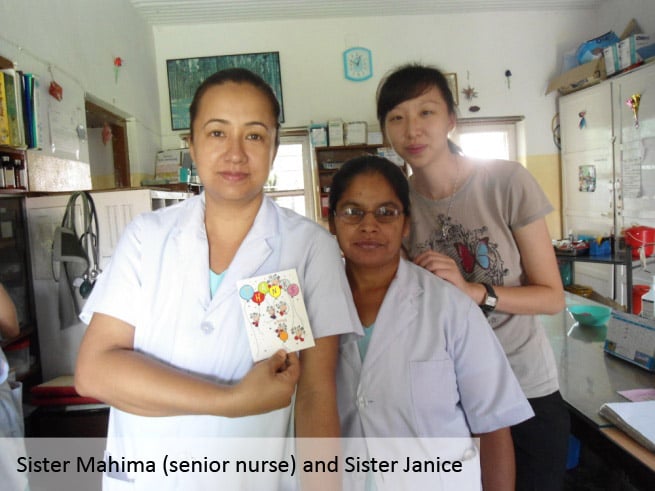 Nepal has taught me patience, especially towards people who speak a different language from me. Sometimes, back in the hospitals here it is so frustrating to not be able to get a history from expatriate workers; but when I was in Nepal, I was placed in their shoes. I was the foreigner with the limited vocabulary, and I felt intimidated, sometimes lost, and frustrated with myself for not being able to communicate better. Expatriate workers who seek treatment in Malaysian hospitals probably feel the same way. Learning a new language is difficult and now knowing what it is like, I probably would not get frustrated so easily with expatriate patients in the future. About others, the lesson is reinforced that my elders have much wisdom to offer, and I should take the time to pause and listen to what they say. Truly think about it and not disregard their advice, which is I think what many young people today do. Experience counts for a lot. I made many good friends in Nepal, even in such a short frame of time, and we still keep in touch. Nepal is a country steep in good family values and because of it, living in its community has felt close-knit, safe and warm. In many things, Malaysia and Nepal share the same values, in terms of filial piety, respecting your elders, the importance of valuing family, and it is a good reminder for me to not lose sight of these values. To conclude, I have no regrets conducting my selectives in Nepal, even though there were times that were difficult and uncertain, it has made this experience all the more richer. Comparing healthcare between Malaysia and Nepal, I am proud to say that Malaysia is not doing too badly in terms of providing adequate quality care to its people. Nonetheless, we still have much room for improvement. Truly, Malaysia boleh! The write-up is written by IMU student, Eunice Ong Song-En, who had the opportunity to have a learning experience in Nepal at Green Pastures Hospital & Rehabilitation Center Pokhara from 21 May – 15 June 2012 via the Student Mobility Programme.
Nepal has taught me patience, especially towards people who speak a different language from me. Sometimes, back in the hospitals here it is so frustrating to not be able to get a history from expatriate workers; but when I was in Nepal, I was placed in their shoes. I was the foreigner with the limited vocabulary, and I felt intimidated, sometimes lost, and frustrated with myself for not being able to communicate better. Expatriate workers who seek treatment in Malaysian hospitals probably feel the same way. Learning a new language is difficult and now knowing what it is like, I probably would not get frustrated so easily with expatriate patients in the future. About others, the lesson is reinforced that my elders have much wisdom to offer, and I should take the time to pause and listen to what they say. Truly think about it and not disregard their advice, which is I think what many young people today do. Experience counts for a lot. I made many good friends in Nepal, even in such a short frame of time, and we still keep in touch. Nepal is a country steep in good family values and because of it, living in its community has felt close-knit, safe and warm. In many things, Malaysia and Nepal share the same values, in terms of filial piety, respecting your elders, the importance of valuing family, and it is a good reminder for me to not lose sight of these values. To conclude, I have no regrets conducting my selectives in Nepal, even though there were times that were difficult and uncertain, it has made this experience all the more richer. Comparing healthcare between Malaysia and Nepal, I am proud to say that Malaysia is not doing too badly in terms of providing adequate quality care to its people. Nonetheless, we still have much room for improvement. Truly, Malaysia boleh! The write-up is written by IMU student, Eunice Ong Song-En, who had the opportunity to have a learning experience in Nepal at Green Pastures Hospital & Rehabilitation Center Pokhara from 21 May – 15 June 2012 via the Student Mobility Programme.




